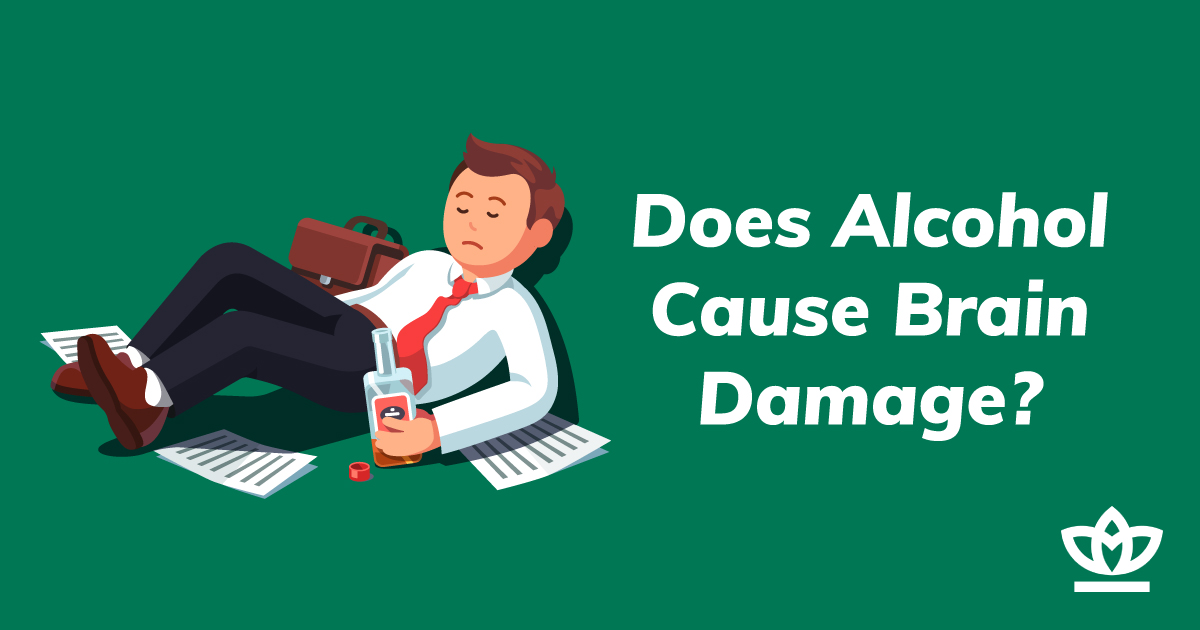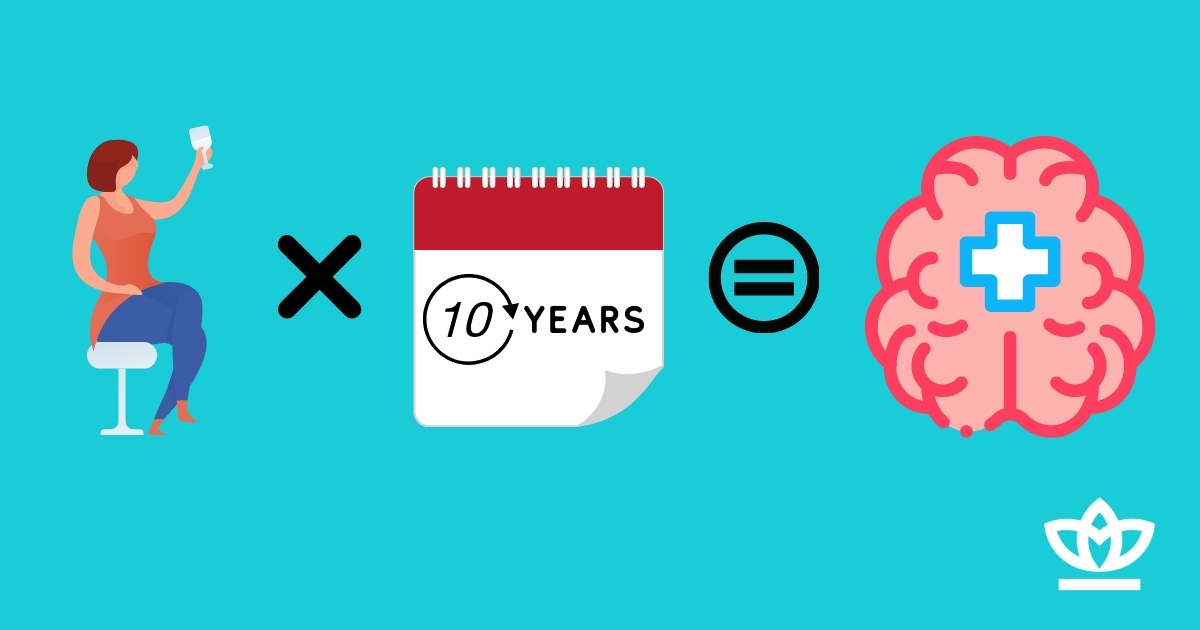Does Alcohol Cause Brain Damage?

Alcohol is deeply connected with modern culture, especially in big cities. If you’ve lived in big cities, you can likely relate to this fact. Alcohol seems to be a normal part of people’s lives.
For some people, drinking alcohol is a way to relax after a whole day of office mess and stress, or for others, it may be a part of socialising to celebrate their happiness.
Although the findings are controversial, some studies have found that alcohol may show some health benefits if consumed at low to moderate levels. However, research also shows that alcohol can have damaging effects if you drink above and beyond the moderate level.
Long-time alcohol drinking can cause memory loss.
Brain damage is one problem that can occur in a person who has a pattern of heavy drinking. Long-time alcohol drinking can cause memory loss. Some of the brain damage and effects on memory may reverse after quitting.
Let’s deeply dig into this.
How Does Alcohol Cause Brain Damage?
Alcohol mainly shows greater deficits in executive and balance function (i.e. solving problems, working memory) compared to any other functional brain components.
Alcohol affects your brain within minutes.
Alcohol starts affecting your brain as soon as it enters the bloodstream, which is within minutes.
Alcohol is absorbed by blood vessels in the stomach and small intestine and processed by the liver. When alcohol goes into the bloodstream, it affects other parts of the body, such as your heart and brain. It interacts with your brain’s neurons to produce the effects you feel, such as pleasure and relaxation. The blood-brain barrier is a highly selective boundary that protects your brain from harmful or foreign substances, but ethanol can pass the barrier.
Alcohol is a central nervous system (CNS) depressant; it acts on the receptor sites of neurotransmitters, such as GABA and dopamine. With enough drinks, it will result in slurred speech and lethargic movement.
The automatic processes of the brain, which is controlled by two parts of the brain called the cerebellum and cerebral cortex, get impaired or slowed by alcohol. It results in slow breathing, imbalance of the body, slow reaction time, and more.
Over time, glutamate neurotransmitters are rapidly released by alcohol and create fuzzy feelings because of dopamine regulation in the reward centre of the brain.
However, overtime alcohol can cause lasting damage to your brain. As per the scientists, Durazzo, Mon, Gazdzinski, and Meyerhoff, alcohol can cause ‘shrinkage’ after reaching some regions of the brain, and it can result in cognitive damage. If a person doesn’t consume alcohol for a long time, then it will likely begin to reverse.
What Factors Affect Alcohol Impact on the Brain?
Many factors affect the impact of alcohol on your brain:
- Your age and sex
- Volume of alcohol you drink
- How quickly you drink
- How often you drink alcohol
- How long have you been drinking
- Age you started drinking
- General health history
- Family history of alcoholism
- Genetic factors
Keep on reading to know the types of alcohol-related brain damage and understand how to get treatment.
Types of Alcohol-Related Brain Damage
There are two types of alcohol-related brain damage which depend on the duration of alcohol consumption.
1. Short-term effects
In occasional or moderate alcohol consumption, the brain may show one or more short-term effects such as memory impairment, recklessness, impaired decision-making, and blackout.
Memory impairment will likely be shown after a few drinks and create a worse scenario if you increase alcohol consumption. If you binge drink on an empty stomach, then you will likely experience a blackout.
Other Short-term Effects
- Vomiting
- Fainting
- Clammy skin
- Decreased body temperature
- Seizures
- Low gag reflex
- Increased risk for breast cancer in women
2. Long-term effects
According to the U.S. National Institute on Alcohol Abuse and Alcoholism, individuals who take heavy consumption of alcohol for a long duration will experience many kinds of brain effects, such as through Wernicke-Korsakoff syndrome, and hepatic encephalopathy.
Wernicke-Korsakoff Syndrome
Wernicke and Korsakoff are two different syndromes but correlated with each other. Wernicke’s encephalopathy is an acute alcohol-related brain dysfunction. It is also known as wet brain and caused by biochemical lesions of your nervous system.
Individuals who are severely deficient of thiamine (vitamin B-1), generally suffer from Wernicke’s encephalopathy. If you have a deficiency of thiamine and consume high doses of alcohol long-term, then it will create difficulty to your body to consume vitamin-B1 and show Wernicke-Korsakoff syndrome.
Symptoms of Wernicke’s encephalopathy
- Imbalance (impaired muscle coordination)
- Malnourishment that will lead to weight loss
- Confusion
- Jerky eye movement with trouble
Korsakoff syndrome is a type of alcohol-related brain damage which usually appears after an appearance of Wernicke’s encephalopathy. Together they are both known as Wernicke-Korsakoff syndrome.
It is also known as Korsakoff’s psychosis and permanent damage to the brain’s part that is responsible for memory. An individual who has this psychosis may have severe memory loss and auditory hallucinations.
According to a study of 2014, men who had more than two and a half drinks a day will experience cognitive decline up to 6 years earlier than moderate drinkers.
Symptoms include in Korsakoff syndrome:
- Memory problem (decreased ability to form new memories)
- Hallucinations
- Severe mood swings
- Personality changes
- Worsen cognitive decline that affects vision, bowel and bladder function, and speech
Hepatic Encephalopathy
In hepatic encephalopathy, the brain gets damaged as a result of liver failure. When your liver fails, toxic chemicals will easily be able to reach your brain because the liver is not able to work correctly.
Your liver is one of the essential organs to screen toxins out of the bloodstream to keep you healthy. High levels or long-term alcohol consumption can severely damage the liver since it gets overworked trying to rid the blood from toxic alcohol.
Symptoms
- Lethargy
- Mood swings
- Slurred speech
- Blurred vision
- Disorientation
Fetal alcohol syndrome
When a pregnant woman consumes alcohol, then fetal alcohol spectrum disorder may happen as a result and cause brain damage to the foetus.
Currently, doctors do not know if there is a safe level of alcohol consumption, so they suggest to stay away from alcohol in every way.
Symptoms vary in severity:
- Hyperactivity
- Weak coordination
- Hearing and vision problems
- Intelligence disabilities
Diagnosis Process of Alcohol-Related Brain Damage

Men develop alcohol-related brain damage after 10 to 20 years of alcohol consumption. However, women may develop brain damage in a shorter period than men due to body size.
Generally, people between the age group of 45 to 60 are commonly diagnosed with alcohol-related brain damage. Typically symptoms take time to show up, and most of the patients usually have permanent damage when they finally receive the diagnosis from doctors.
However, the brain is a multi-functional part of your body, and it is capable of regenerating to an extent. With diagnosis and proper treatment, some brain damage can be cured and reversed.
Treatment of Alcohol-Related Brain Damage
Alcohol causes severe damage to your brain, and a few other alcohol-related conditions can cause lifelong brain damage. However, some side effects are reversible after a period of treatment and abstinence from alcohol.
If you think you are safe at a moderate level of alcohol consumption, then change your mind. According to research in The BMJ, alcohol consumption, even at moderate levels, is associated with adverse brain results including hippocampal atrophy. These findings are supported by UK alcohol guidance.
Physicians may follow these types of strategies to treat alcohol-related brain damage:
- Administering thiamine to prevent Wernicke-Korsakoff syndrome and improve brain function
- L-aspartate to treat lower blood ammonia concentrations
- Liver transplantation in severe cases of hepatic encephalopathy
Most importantly, you need years of abstinence from alcohol to help heal alcohol-related brain damage.
If you have any questions, then let us know in the comment section.
If you, or your loved one, are experiencing any symptoms discussed above, then go to a treatment specialist.













